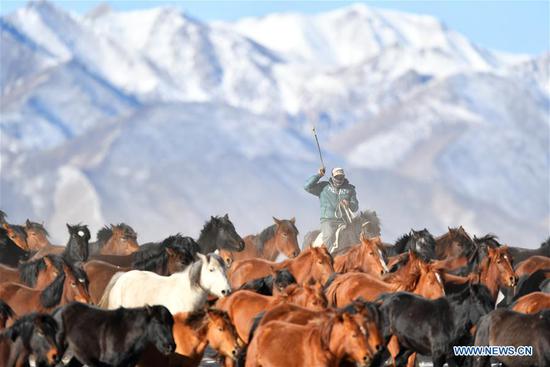
Piglets are held in pens at a modern pig farm in Beijing on April 30. (Wu Bo/For China Daily)
Some travelers flying home ahead of the Spring Festival this year may not be able to bring home pork products as New Year gifts as they did in the past.
The decision came after a number of airports moved to limit such luggage on board in an effort to contain the spread of African swine fever, which has wreaked havoc in pig farms nationwide over the last six months.
It coincided with Chunyun, the annual 40-day travel peak that straddles Spring Festival, kick-started on Monday. Hundreds of millions of Chinese will travel home for the Chinese Lunar New Year, which falls on Feb 5 this year.
In Sichuan province, airlines hubs including the Yibin Caiba Airport and the Panzhihua Baoanying Airport have decided to ban raw pork from flying, and discouraged passengers taking pork products, such as sausages and bacon popular in the region.
A similar policy also applies to the Yichang Sanxia Airport in Hubei province, which cited concerns for transmitting the disease, which has a high mortality rate for pigs but does not affect humans.
But major airports including the Beijing Capital International Airport, Chongqing Jiangbei International Airport and the Xi'an Xianyang International Airport said they have no such restrictions.
Neither did some airports in the regions hit hard by the pig virus. The Yinchuan Hedong International Airport in the Ningxia Hui autonomous region and the Chengdu Shuangliu International Airport in Sichuan said raw pork could be carried in the checked luggage as long as it is properly wrapped.
An employee with the Yibin Caiba Airport suggested passengers do not bring pork with them at this special time because the policy varied from place to place, and could cause trouble if local airports deny such luggage. She asked not to be named because she is not authorized to speak publicly.
To add to the dilemma for those who wish to bring home some pork specialties for the annual family reunions, the major courier services-including SF Express and Yunda-also suspended delivery service for raw pork or any food containing the meat.
Wang Xiaochen, a deliveryman with SF Express, said the restriction came last month and has been "extremely strict".
But train stations nationwide have not declared such restrictions, according to the China Railway Corp, the national railway operator.
Zhu Zengyong, an agriculture analyst at the Chinese Academy of Agricultural Sciences, said the restrictions are necessary as the pork that is not processed at high temperatures carries the risk of spreading African swine fever. He said pigs could be infected by feeding on such food residues, which is illegal now.
"Risky items include raw pork and bacon," he said.
China is the world's largest producer and consumer of pork.
The country reported its first-ever outbreak of African swine fever in Shenyang, Liaoning province, on Aug 1, and has taken a series of measures to contain the disease, including strict controls on the movement of pigs and pork products, increased compensation prices for culling pigs to encourage early reporting, and banning the use of blood plasma in pig feed.
(Wang Keju contributed to this story.)


















































